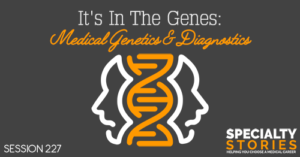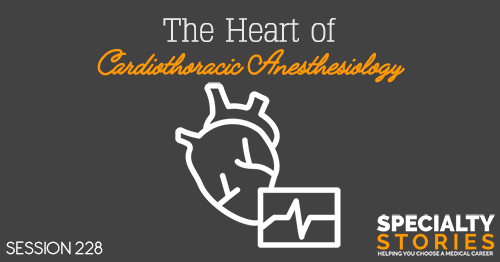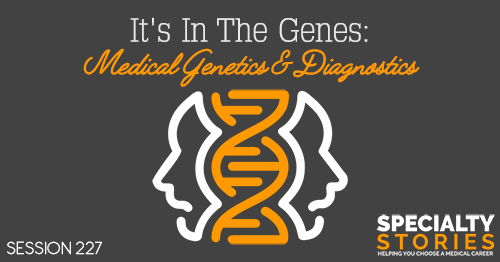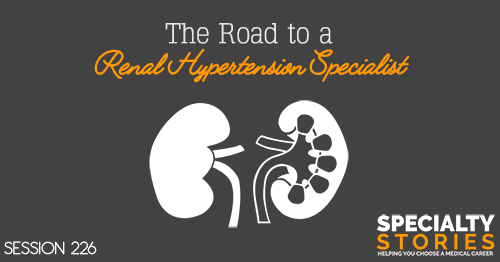Apple Podcasts | Google Podcasts
Session 227
Today, we chat with Dr. Wayne Grody about his journey to specializing in Medical Genetics and why not a lot of students and other medical colleagues know they exist. If this is something you’re interested in, check out the American College of Medical Genetics.
For more podcast resources to help you with your medical school journey and beyond, check out Meded Media.
Listen to this podcast episode with the player above, or keep reading for the highlights and takeaway points.
[01:37] Interest in Medical Genetics
Wayne remembers reading a book when he was 10 years old and he was trying to figure out the double-helical structure of DNA. Although he didn’t even know what a molecule was, he was just fascinated by the beauty of a molecule. He was amazed by how we could determine so much about ourselves biologically. At that point, he had a feeling he would have a career using DNA.
Medical genetics wasn’t even a recognized specialty by the American Board of Medical Specialties (ABMS) at that time.
Instead, it was an informal subspecialty of pediatrics for decades. In fact, for a long time, these diseases were seen by endocrinologists. They were already seeing diabetes, which is kind of genetic, and they understood biochemical pathways. So there really weren’t geneticists or medical genetics.
It wasn’t until Wayne finished his training in 1990 that medical genetics was recognized as a specialty.
Wayne is the Founding Director of UCLA’s molecular diagnostic laboratories which started in the mid-80s when none of those things existed. In other words, he didn’t have anything to train for. And so, he had to train himself and grandfathered himself when it became a recognized specialty called Clinical Molecular Genetics.
Although medical genetics started out as a subspecialty, it was approved by the ABMS as a specialty in 1990. Hence, theoretically, you can enter a medical genetics residency directly out of med school. Now, most programs, including theirs would prefer that you do one or two years at least have some other more common specialty. It could be anything or a rotating internship. There are a few programs that will accept you directly. But most of them have done part or all of some other residency like the ones I mentioned.
'What I love about medical genetics is we see people with problems in every organ system and we consult and interact with every other specialist.'Click To Tweet[07:22] The Biggest Myths and Misconceptions Around Medical Genetics
When Wayne served as president of the American College of Medical Genetics, they spent most of their meetings just worried about the manpower and how they were going to keep the specialty going.
Some of it is due to the misconceptions that medical students and beginning residents have. They think it’s only the ultra-rare diseases that there is no treatment for. The salaries are terrible because it’s part of pediatrics and pediatricians are underpaid, which is true.
There’s also that notion that you’ve got to be a basic researcher or you won’t survive. Wayne clarifies there’s a grain of truth to each of those, but they’re easily surmountable.
Add the fact that the reimbursement system in medicine is not good. The people who do procedures get reimbursed very well and the ones who don’t do procedures don’t. Especially without physical procedures, it’s going to be pretty under reimbursed. Genetics is like that. But with some enzyme replacement therapies, they now do some infusions and so on.
Carving Out Your Niche
Moreover, Wayne explains that you can have any career you want. Most of them work at academic centers. Many of them have a research lab on the side. But you don’t have to do that. Any decent-sized community hospital can definitely use one or more medical geneticists.
'There's more things in life than just the money. If you're happy in your work that means more than a long term debt.'Click To TweetMedicine is tough enough, and if you don’t go into a part of it that you truly love, it’s going to be unbearable torture. And so, you’ve got to choose an area you love.
One thing great about an MD is there are so many opportunities for what you can do. You can do only basic research and no clinical, you can work at the FDA. Because of that, Wayne was able to not only find, but also create a niche for him because the specialty didn’t exist at the time.
[12:41] Where Do They Fit in the Medical World
In general, they’re a consulting specialty. They’re not primary care. The diseases are generally kind of rare so you need a larger catchment area. It’s also very high tech in molecular genetics these days so you need the infrastructure of an academic center or a large HMO like Kaiser.
They see patients who’ve been on a long, “diagnostic odyssey,” which can be anywhere for months to decades. These patients have already seen 100 specialists, each one bringing their own MRIs and tests, and all of them coming out negative or inconclusive. Finally, someone thinks maybe this is genetic and refers them to molecular geneticists.
Being the last stop, sometimes they can’t help, but sometimes too, they will make a diagnosis and there might even be a targeted therapy for it. They would very much like it for their specialty to be a little higher up in the algorithm.
Also, the one thing that changed his field the most 10 years ago was the advent of genomic sequencing. Now, they can look at all of the genes in the genome at once instead of just the cystic fibrosis gene one at a time. And that has ended the “diagnostic odyssey” for a lot of patients.
Unfortunately, it’s not ordered until they’ve been frustrated for 10 years, and Wayne wishes they would order in the first few months.
[14:47] How Far Away Are We From a Full Genomic Type Panel
Interestingly, since Wayne is based in Los Angeles, he does consulting for movies and TV shows when there’s a genetic or DNA plot, or a weird disease. In fact, he had a contribution in the making of the movie Gattaca. He adds that although it’s extreme, the ethical issues the movie brings up, such as discrimination and invasion of privacy, are basically the same ones we deal with all the time in genetic testing.
Accessibility to DNA Sequencing
That being said, the costs of DNA sequencing have come down over the last 20 years. The human genome project took 13 years at $3 billion to sequence the first human genome. That obviously wouldn’t be a clinical test with that kind of turnaround time. Then it went down to a few million dollars then to a few hundred thousand dollars. Now, it’s in the range of a few thousand dollars.
Once it gets that cheap, Wayne is hopeful that every newborn will have a complete genome sequence.
They already have a heel stick to do newborn screening for biochemical diseases like PKU. You can get plenty of DNA out of those filter blots.
The Risks of Discrimination
There are obviously risks of discrimination and so on. Probably, the data will be stored somewhere on the electronic medical record. And the question will be, which parts of it do you report out and when.
Wayne prefers for adult onset disorders like Huntington’s disease or familial breast cancer, to not be reported out in a newborn or a three-year-old. Maybe you could program that computer when the person turns 18 or 21, and it would then pop up and the primary care physician would deal with it.
It’s an interesting ethical dilemma when you have to tell someone that they weren’t built the best genetically.
The Concept of Genetic Exceptionalism
The ethicists feel that somehow genetics, because of its predictive nature, is somehow different from the whole rest of medicine and needs a whole other bunch of ethical guidelines. Wayne generally fought against that.
[20:42] Typical Day
One great thing Wayne likes about his specialty is there is no typical day or typical week. He does so many different things all the time. He does a lot of teaching, both lectures, in the clinic, and in the lab. He sees patients and directs his lab, which always has technical and ethical issues coming up every day.
Wayne is on a zillion committees, both local and national, because this is so cutting edge and new. People are worried about potential ethical abuses, insurance, discrimination, and all that kind of stuff.
Wayne even had the opportunity to testify before Congress as the expert witness in the BRCA gene patent case that went all the way to the Supreme Court. All of that will take time, but at different times.
Wayne has to be flexible as to how things will expand and contract. And although he enjoys this wide variety of things that he gets to do, it is maybe not for everybody.
'Every week, there are new disease genes being discovered… new tests we can offer and we understand the disease better at the molecular level. It's constantly changing and expanding.'Click To Tweet[23:10] Understanding 100% of the Genome
When the genome project was announced and started in 1990, Wayne was worried that when it finished, it was supposed to be 15 years later, but they finished it two years early. They had the whole sequence. Now, they’ve had a lot of gaps in it.
He naively thought that that would be the end of genetics as a specialty and that they would now know everything. But all that sequence gave them was the one-dimensional, four-letter sequence. That’s the most simple part of it because there are so many other levels of gene expression.
Although they’re now doing clinical sequencing for all 28,000 genes, they still don’t know how to link up three different genes that may all be causing the same disease. He admits it’s beyond their capability right now. It’s another thing that’s great about the specialty because there will be more work for people.
'We won't understand the genome and how it works probably for at least another 100 years.'Click To Tweet[25:27] Message to Primary Care Physicians
Medical genetics is a very small part of medical school. And Wayne keeps arguing that Genetics underlies every other specialty so they ought to have it. But many students graduate medical school, not even knowing that this specialty exists.
And so, what Wayne would like primary care people to do is to at least know of the existence of the specialty. There are genetic counselors that can be a huge help as well. Their organization, National Society of Genetic Counselors offers geographic listings of where they can find people.
Some people say only a geneticist should run a genetic test, but Wayne begs to disagree. There are obviously certain ones that are so emotional and problematic, like the BRCA tests, and the Huntington’s. In those cases, he would prefer those to come through them, or at least through a neurologist for ALS or Huntington’s. But other than that, Wayne would like the primary care physicians to just try to keep up a little, and the American Medical Association (AMA) has a lot of educational stuff.
Wayne encourages primary care physicians to reach out to them if they ever think there’s a genetic issue, or even if the patient is just worried about it. You don’t have the time and primary care to do all that kind of taking the detailed pedigree. But as medical geneticists, they can spend up to two hours with a patient that a primary care physician cannot do. So please refer the patients to them.
[31:54] Degree of Interaction with Patients and Other Specialties
There are various sub-specialties in medical genetics and clinical genetics is patient care. In molecular genetics, which is the lab he directs, you could just be in the lab all day, if you want it.
Whereas in clinical genetics, you will have lots of right up-front contact even all day long, if you want. And the thing Wayne loves most about is they interact with all the other specialties.
[33:43] The Most and Least Liked Things
Wayne loves most of the things about his specialty and he really wished there had more visibility, both with the general public and with his medical colleagues. Although he might bash the direct-to-consumer genetic testing companies, he does give them credit as they have raised the visibility in some little knowledge of DNA. That being said, Wayne wishes they were a little more informed about what they have to offer and what they can do and not do.
Wayne also points out what keeps med students from entering this job due to their premed experience in biochemistry and organic chemistry. It made them very afraid of biochemical pathways.
And so, Wayne assures that it’s not that intimidating and it’s not rocket science so don’t let that steer you away. But there is a lot of basic science knowledge we have to at least be somewhat familiar with.
[36:28] Major Changes Coming to the Field
CRISPR is a unique technology that allows geneticists to edit parts of the genome through either the removal, addition, or alteration of sections of the DNA sequence. Wayne hopes they wouldn’t do any procedure that has any risk, which CRISPR does for trivial purposes, like blonde hair and height.
Other than that, Wayne thinks CRISPR will be the way to go. In terms of gene replacement therapy, which have been tried for the last 40 years, there have been a few successes with sickle cell. But in general, it’s not been that great. Whereas CRISPR is much faster, cheaper, and efficient. It’s highly accurate and down to the single nucleotide level.
Wayne mentions a paper in the New England Journal last summer about the disease called transthyretin amyloidosis. It’s a liver disease where the abnormal protein is getting pumped out and deposited in all other organs and causing organ failure. They delivered the whole CRISPR system to chop up the gene to the liver by enclosing it in a little nanoparticle with RNA. It’s like the COVID vaccine, infusing it and it went to the liver and it essentially cured those people. Wayne believes this is the way to go in the future – and we’re close to it.
[38:57] Final Words of Wisdom
If he had to do it all over again, Wayne says he would, assuming he still went to medicine. He doesn’t really know of any other specialty where he would be enjoying just every minute of it, where it’s perfectly tailored to his sensibility.
Wayne wishes to tell students who might consider this specialty is to keep an open mind. Lastly, if you have a truly passionate curiosity about human disease and how it’s caused at the molecular and biochemical level, and a desire to be a lifelong learner, this is a perfect specialty for you.
Links:
American College of Medical Genetics
National Society of Genetic Counselors
American Medical Association (AMA)
Journal: Gene Editing — A Cure for Transthyretin Amyloidosis?
SEARCH SITE
LISTEN FOR FREE












